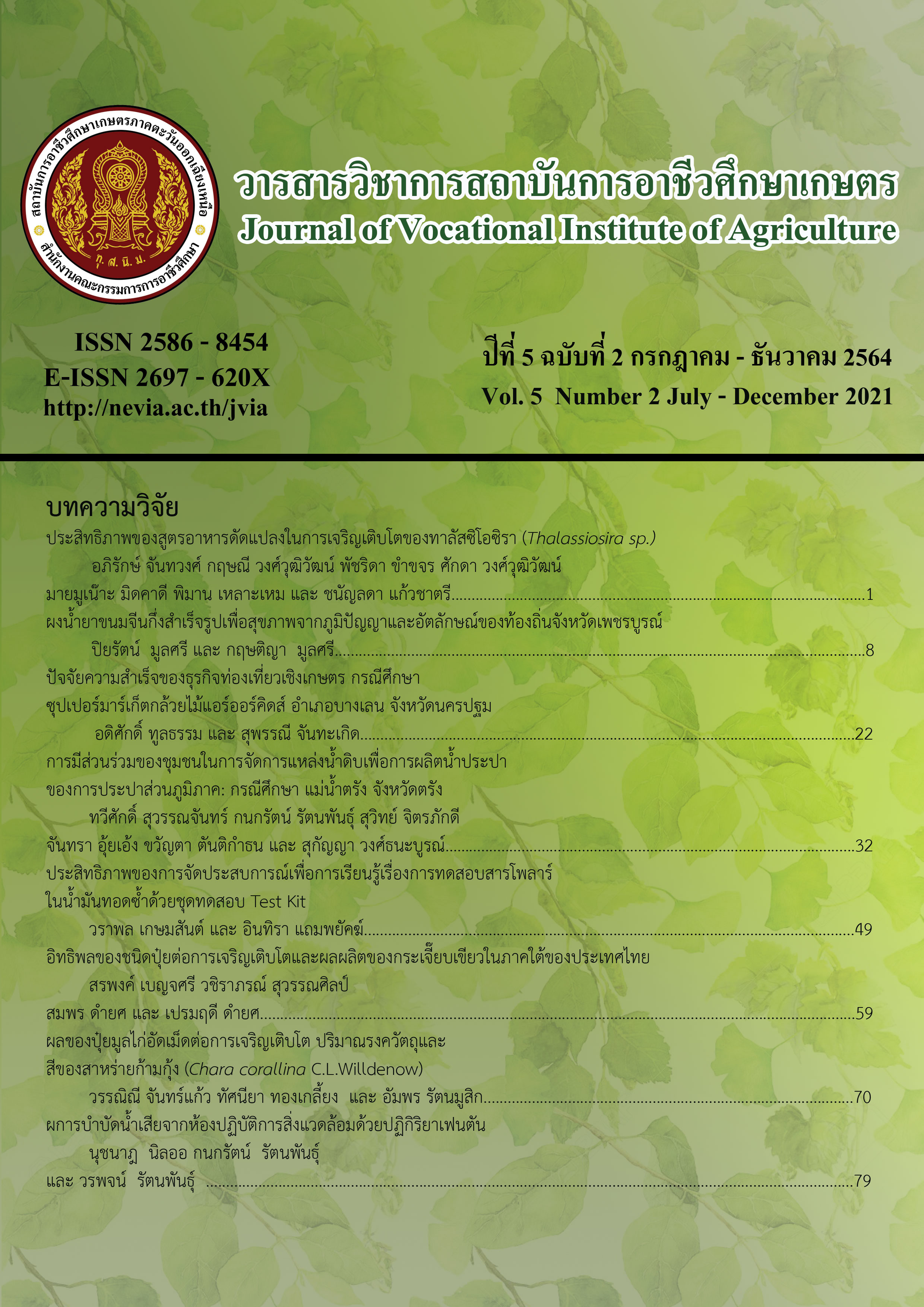Influence of Fertilizer Types on Growth and Yield in Okra (Abelmoschus esculentus (L.) Moench) in Southern Thailand
Main Article Content
Abstract
Study on the influence of fertilizer sources on growth and yield of okra. Okras were planted and applied in different fertilizer types. The experiments were divided into 5 fertilizers (treatments) consisting of trt 1) okras were planted without fertilizer, trt 2) applied by chemical fertilizer, trt 3) applied by pig manure, trt 4) applied by cow manure and trt 5) applied by poultry manure. The experiment was laid out in a Randomized Complete Block Design (RCRD) with four replications, ten plants/replication at Faculty of Technology and Community Development, Thaksin University. The result of the study showed that there were significant differences between the treatments (P≤0.05) in most of the parameters assessed. The pig manure recorded the highest value in fruits/plant (65.23 fruit/plant), following by cow manure, poultry manure, chemical fertilizer and control about 54.94, 54.87, 50.62 and 17.87 fruits/plant, respectively. The yields/pod was not significant differences (P>0.05) between treatments (chemical fertilizer, Pig manure, poultry manure and cow manure) about 22.71, 22.59, 22.46 and 22.46 g/pod respectively. The fruit yield/plants were most important characteristic found that pig manure had the height yields/plant (1,473.55 g/plant), following by cow manure, chemical fertilizer poultry manure and control about 1,218.23, 1,149.58 1,122.64 and 271.98 g/plant, respectively. Chemical fertilizer was recorded the height firmness (1,110.65). Control, pig manure, cow manure and poultry manure were recorded firmness 1,009.05, 833.99, 831.86 and 812.37 g respectively. While, Okra Yellow Vain Disease and insect pests were not significant different between treatments (P>0.05).
Article Details

This work is licensed under a Creative Commons Attribution-NonCommercial-NoDerivatives 4.0 International License.
The content and information in articles published in the Journal of Vocational Education in Agriculture are the opinions and responsibility of the article's author. The journal editors do not need to agree or share any responsibility.
Articles, information, content, etc. that are published in the Journal of Vocational Education in Agriculture are copyrighted by the Journal of Vocational Education in Agriculture. If any person or organization wishes to publish all or any part of it or to do anything. Only prior written permission from the Journal of Vocational Education in Agriculture is required.
References
Benchasri, S. (2012) Okra (Abelmoschus esculentus (L.) Moench) as a valuable vegetable of the world. Ratarstvo i povrtarstvo, 49(1), 105-112.
Benchasri, S., et al. (2020). The effect of genotypic variability on the yield and yield components of okra (Abelmoschus esculentus L. Moench) in Thailand. Asian Journal of Agriculture and Biology, 8(4), 480-490.
Gavint, K.N. et al. (2018). To study the nature and magnitude of heterosis for fruit yield and yield attributes in okra [Abelmoschus esculentus (L.) Moench]. Journal of Pharmacognosy and Phytochemistry, 7(1), 2583-2587.
สกุลกานต์ สิมลา และสรพงค์ เบญจศรี. (2558). การประเมินลักษณะทางการเกษตรและผลผลิตของกระเจี๊ยบเขียวในจังหวัดมหาสารคาม. แก่นเกษตร, 43(1), 894-899.
อัญจนา จันทร์ปะทิว และ วรรณพร สิทธิกานต์. (2562). อิทธิพลของระยะปลูกและอัตราการใช้ปุ๋ยเคมีที่มีผลต่อการเจริญเติบโตและองค์ประกอบของผลผลิตกระเจี๊ยบเขียว. แก่นเกษตร, 47(1), 1557-1562.
Bello, B.O. & Aminu, D. (2017). Genetic relationships among okra (Abelmoschus esculentus (L.)Moench) cultivars in Nigeria. Acta agriculturae Slovenica, 109(2), 251-260.
Benchasri, S. (2015). Effects of chemical and organic agricultural systems for okra (Abelmoschus esculentus L. Moench) production in Thailand. Australian Journal of Crop Science, 9(10), 968–975.
Hayaza, S., et al. (2018). Anticancer activity of okra raw polysaccharides extracts against human live cancer cells. Tropical Journal of Pharmaceutical Research, 18(8), 1667-1672.
Lu, Y., et al. (2016). Oligomeric proanthocyanidins are the active compounds in Abelmoschus esculentus Moench for its α-amylase and α-glucosidase inhibition activity. Journal of Functional Foods, 20, 463–471.
Graham, J.O., et al. (2017). Total phenol content and antioxidant activity of okra seeds from different genotypes. American Journal of Food and Nutrition, 5(3), 90-94.
Zhang, T., et al. (2018). Preliminary characterization and anti-hyperglycemic activity of a pectic polysaccharide from okra (Abelmoschus esculentus (L.) Moench). Journal of Functional Foods, 41, 19–24.
สรพงค์ เบญจศรี และชฎารัตน์ บุญจันทร์. (2554). ศึกษาความเป็นไปได้ในการตัดสินใจปลูกกระเจี๊ยบเขียวภายใต้ระบบเกษตรอินทรีย์เพื่อเป็นอาชีพเสริมของเกษตรกร ตำบลบ้านเภอป่าพะยอม จังหวัดพัทลุง. วารสารมหาวิทยาลัยนเรศวร, 19(1), 24 – 32.
Moekchantuk, T. & Kumar, P. (2004). Export okra production in Thailand. Bangkok: Inter-country programme for vegetable IPM in South & SE Asia phase II Food & Agriculture Organization of the United Nations.
สรพงค์ เบญจศรี. (2555). การประเมินการเกิดโรคและแมลงศัตรูพืชของกระเจี๊ยบเขียวในภาคใต้ของประเทศไทย. วารสารวิชาการพระจอมเกล้าพระนครเหนือ, 22(1), 57-66.
Benchasri, S. (2011). Screening for yellow vein mosaic virus resistance and yield loss of okra under field conditions in Southern Thailand. Journal of Animal & Plant Sciences, 12(3), 1676-1686.
Rynjah, S. (2018). Field screening of okra (Abelmoschus esculentus L. Moench) genotypes against okra yellow vein mosaic virus disease. Journal of Pharmacognosy and Phytochemistry, 7(5), 1852-1854.
Tiamiyu, R.A., et al. (2012). Effect of sources of organic manure on growth and yields of okra (Abelmoschus esculentus L.) in Sokoto, Nigerian. Nigerian Journal of Basic and Applied Sciences, 20(3), 213-216.
Nweke, I.A., et al. (2013). Effect of different sources of animal manure on the growth and yield of okra (Abelmoschus Esculentus L.Moench) in Ustoxic Dystropept at Enugu South Eastern,
Nigeria. International journal of scientific & Technology research, 2(3), 135-137.
Adesina, O.L. & Wiro, K.O. (2020). Influence of poultry manure rates on the growth and yield of okra (Abelmoschus esculentus (L.) Moench) in Rivers State. Journal of Experimental Agriculture International, 42(1), 116-120.
Adhikari, A. & Piya, A. (2020). Effect of different sources of nutrient on growth and yield of okra (Abelmoschus esculentus L. Monech). International Journal of Environmental & Agriculture Research, 6(1), 45-50.
Benchasri, S. & Bairaman, C. (2013). Preliminary studies on incidence of insect pests on okra (Abelmoschus esculentus (L.) Moench) in Thailand. Bulgarian Journal of Agricultural Science, 19(2), 209-215.

